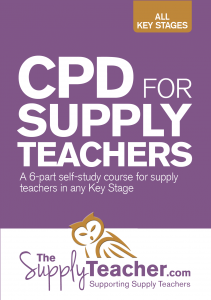When Classpeople agreed to review this six part course we had hoped it would be packed with useful learning tools and success tips and we were not disappointed. What we hadn't expected was an all-round supply teachers’ guide to working, something to keep in your supply bag for reflection as a ‘self-check’ manual.
Starting with the basics which, quite ironically, are the first things we forget, this CPD course will walk you step-by-step through your supply plan. It will give you a tool belt to ensure that you are ‘armed and ready for battle’ whilst holding your hand and providing constant support.
The way that the modules have been broken down to make them easy to digest and walk you through the key areas of support was particularly impressive. The direction provided is a breath of fresh air that will allow you to feel confident when starting the day, even on a last minute assignment. The modules are interactive with a constant opportunity to reflect, plan and self-review. This allows the participant the ability to get underneath any issues or areas of concern and develop them prior to moving on to the next module. It can be very easy to disassociate when reading; this approach manages to prevent that from happening and re-focuses on the important issue at hand, ‘Where are you in your supply career and where do you want to get to?’
Success tools such as links to additional information on each module mean that the participant is not ‘overwhelmed’ with information but still has the ability to delve deeper in to areas of interest or concern. Inclusion of video links to relevant content allows the brain to shift and provides visual inspiration. I particularly liked the idea of having a person in mind when approaching the type of person you would like to become to actively target the desired behaviours and create the skillset and confidence required.
Inspirational quotes help lift the segments and reinforce self-belief for any self-doubters and the gentle coaching language style helps make the reader feel secure. Self-analysis forces the reader to take responsibility and many of the development skills imparted could easily be adopted and applied to sectors outside of education. Taking this course will help supply teachers learn how to create a seamless education environment whilst flexing their creative muscles and getting stuck in. A must for any supply teacher starting out and highly recommended even to the more established supply teacher.
Review by Tanith Harding, Marketing Manager, Classpeople
CPD Course for Supply Teachers
The 6 modules are as follows:
1. Presenting Yourself as a Professional
2. Building Self-Confidence
3. Improvisation Skills
4. Behaviour Management
5. Building Long-Term Professional Relationships
6. Time for Reflection
Each module will take between 3-5 hours to complete.
CPD for Supply Teachers, a self-study course, is priced at £15.00. The course will be delivered as a Word document (.docx), and a self-evaluation certificate for your CPD file will be sent in a separate email.
£15.00 – upon completion of payment, please click on 'Return to Merchant' which will take you to the document for download.
Your Certificate will follow by email within a few days.
 Kate Wright, Director & Education Consultant at Top Class Education, kindly sent us her review of CPD for Supply Teachers:
Kate Wright, Director & Education Consultant at Top Class Education, kindly sent us her review of CPD for Supply Teachers: The genuine fear of the telephone not ringing to offer work will resonate with most supply teachers, the anxiety built on that fear will be different for everyone, but it will always be built on the firm foundations of fear. Not getting that phone call when there's bills to pay is real, but not always something you have lots of control over, how you deal with the lack of call and associated worry is controllable, with practice. How you climb up the ladder of anxiety when the call doesn't come may feel like something rapid and out of control, but there are techniques to talk yourself down because it is within your control. I'm not talking about deep rooted, clinical anxiety that limits life and ability, I'm talking about day to day anxiety that can blow up like a balloon that rarely pops, (but it can be deflated!)
The genuine fear of the telephone not ringing to offer work will resonate with most supply teachers, the anxiety built on that fear will be different for everyone, but it will always be built on the firm foundations of fear. Not getting that phone call when there's bills to pay is real, but not always something you have lots of control over, how you deal with the lack of call and associated worry is controllable, with practice. How you climb up the ladder of anxiety when the call doesn't come may feel like something rapid and out of control, but there are techniques to talk yourself down because it is within your control. I'm not talking about deep rooted, clinical anxiety that limits life and ability, I'm talking about day to day anxiety that can blow up like a balloon that rarely pops, (but it can be deflated!)

